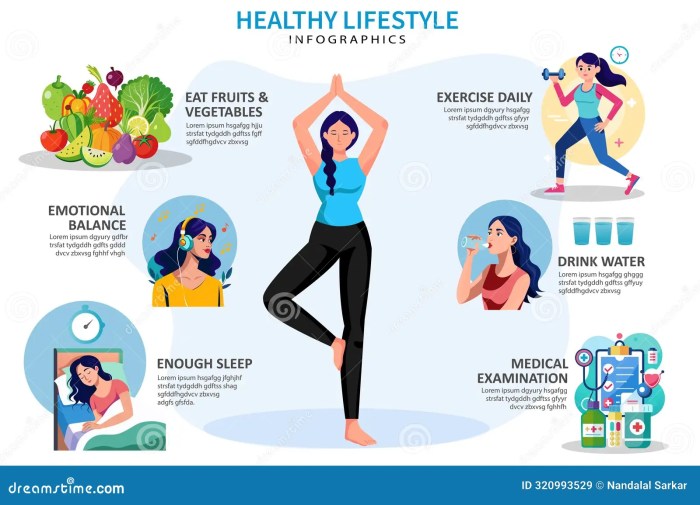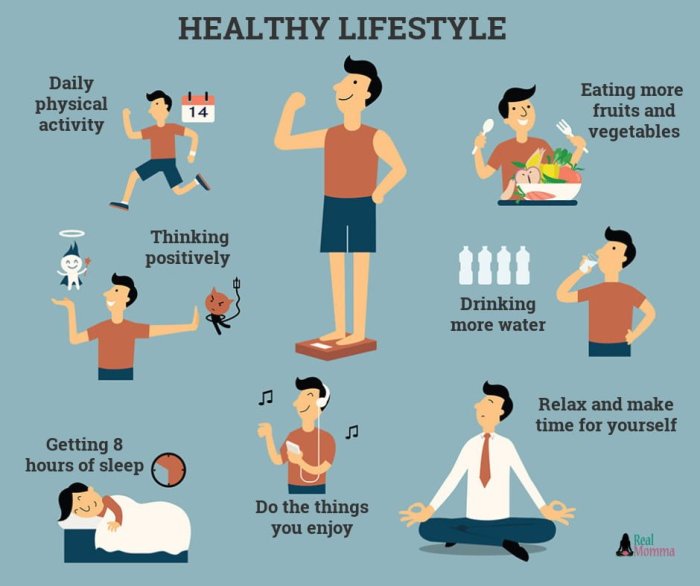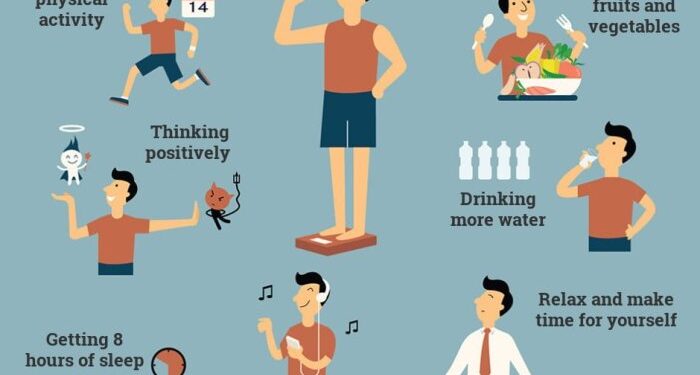Embark on the journey of creating a stress-free healthy lifestyle routine with this comprehensive guide. From setting the foundation to incorporating balanced routines, this topic covers all aspects essential for a healthier and happier you.
Setting the Foundation
To build a stress-free healthy lifestyle routine means establishing habits and practices that promote physical, mental, and emotional well-being while reducing the negative effects of stress. It involves creating a balanced daily schedule that prioritizes self-care, healthy eating, regular exercise, and mindfulness activities.
Benefits of Incorporating a Stress-Free Healthy Lifestyle Routine
- Improved overall health and well-being
- Increased energy levels and productivity
- Reduced risk of chronic diseases
- Better stress management and resilience
- Enhanced mood and mental clarity
Activities for a Stress-Free and Healthy Lifestyle
- Practicing mindfulness and meditation to reduce stress levels
- Engaging in regular physical exercise such as yoga, walking, or strength training
- Eating a balanced diet rich in fruits, vegetables, whole grains, and lean proteins
- Prioritizing quality sleep and establishing a relaxing bedtime routine
- Setting boundaries and learning to say no to avoid overcommitting
Creating a Balanced Routine

Achieving a balanced routine is essential for maintaining a healthy lifestyle. It involves harmonizing work, exercise, nutrition, and relaxation to ensure overall well-being.
Work-Life Balance
Maintaining a balance between work and personal life is crucial. Set boundaries, prioritize tasks, and schedule breaks to avoid burnout. Remember, work is important, but so is your mental and physical health.
Exercise
Incorporate regular physical activity into your routine. Aim for at least 30 minutes of exercise most days of the week. This can include activities like walking, jogging, yoga, or strength training. Find activities you enjoy to make it sustainable.
Nutrition
Focus on consuming a variety of whole foods, including fruits, vegetables, lean proteins, whole grains, and healthy fats. Avoid processed foods and excessive sugar intake. Stay hydrated by drinking plenty of water throughout the day.
Relaxation
Make time for relaxation and stress management techniques. This can include meditation, deep breathing exercises, spending time in nature, or engaging in hobbies you enjoy. Prioritize quality sleep to rejuvenate your body and mind.
Daily Schedule Example:
- 6:00 AM - Wake up and practice morning meditation
- 7:00 AM - Healthy breakfast with protein, fiber, and vitamins
- 8:00 AM - Start work with scheduled breaks every 90 minutes
- 12:00 PM - Nutritious lunch with a balance of nutrients
- 5:00 PM - Exercise session (jogging, yoga, or strength training)
- 7:00 PM - Relaxation time (meditation, reading, or hobbies)
- 9:00 PM - Wind down with a light snack and prepare for bed
- 10:00 PM - Quality sleep for at least 7-8 hours
Exercise and Physical Activity
Regular exercise plays a crucial role in reducing stress levels and promoting overall health. Physical activity releases endorphins, also known as "feel-good" hormones, which help to improve mood and reduce anxiety. Additionally, exercise can help increase energy levels, improve sleep quality, and boost self-esteem.
Types of Exercises for Varying Fitness Levels
- Low-intensity exercises: Walking, yoga, and tai chi are great options for beginners or those with limited mobility.
- Moderate-intensity exercises: Jogging, cycling, swimming, or dancing can provide a good balance of challenge and accessibility for intermediate fitness levels.
- High-intensity exercises: Running, HIIT (high-intensity interval training), and weightlifting are suitable for advanced fitness levels looking to push their limits.
Tips for Consistent Exercise Routine
- Schedule it in: Treat exercise like any other important appointment and block off time for it in your daily calendar.
- Find activities you enjoy: Choose exercises that you find fun and engaging to increase the likelihood of sticking to your routine.
- Start small: Begin with short sessions and gradually increase the duration and intensity as your fitness improves.
- Mix it up: Incorporate a variety of exercises to prevent boredom and target different muscle groups for a well-rounded workout.
- Stay accountable: Consider working out with a friend, joining a class, or hiring a personal trainer to help you stay motivated and committed.
Nutrition and Healthy Eating
Eating a balanced and nutritious diet plays a crucial role in managing stress levels and promoting overall well-being. The foods we consume can have a direct impact on our energy levels, mood, and ability to cope with stress. By focusing on healthy eating habits, you can support your body in dealing with daily challenges and maintaining a sense of balance.
Creating a Balanced and Nutritious Meal Plan
When planning your meals, aim to include a variety of nutrient-dense foods such as fruits, vegetables, whole grains, lean proteins, and healthy fats. These foods provide essential vitamins, minerals, and antioxidants that support your immune system and reduce the negative effects of stress on the body.
Additionally, try to limit processed foods, sugary snacks, and excessive caffeine intake, as these can contribute to feelings of anxiety and fatigue.
- Start your day with a nutritious breakfast to kickstart your metabolism and stabilize blood sugar levels.
- Include a source of protein in each meal to keep you feeling full and satisfied throughout the day.
- Incorporate colorful fruits and vegetables to ensure you're getting a wide range of nutrients.
- Stay hydrated by drinking plenty of water and herbal teas to support digestion and overall health.
Remember, a well-rounded meal plan is key to nourishing your body and mind, and supporting your overall well-being.
Meal Ideas for a Stress-Free Healthy Lifestyle
Here are some simple meal ideas that align with a stress-free healthy lifestyle:
- Grilled chicken with quinoa and roasted vegetables
- Salmon salad with mixed greens, avocado, and a citrus vinaigrette
- Vegetable stir-fry with tofu and brown rice
- Greek yogurt parfait with berries and granola
Mindfulness and Stress Management
Mindfulness is the practice of being fully present and aware of your thoughts, feelings, and surroundings without judgment. It involves focusing on the present moment and accepting it for what it is. This practice has been shown to have numerous benefits for stress reduction and overall well-being.
Techniques for Managing Stress
- Meditation:Spending a few minutes each day meditating can help calm the mind and reduce stress. Focus on your breath or a mantra to bring your attention back to the present moment.
- Deep Breathing Exercises:Taking slow, deep breaths can activate the body's relaxation response and help reduce stress levels.
- Progressive Muscle Relaxation:This technique involves tensing and then relaxing each muscle group in the body to release physical tension and promote relaxation.
Importance of Self-Care Practices
Self-care practices play a crucial role in maintaining a stress-free routine. By taking care of your physical, mental, and emotional well-being, you can better cope with stress and prevent burnout.
Remember that self-care is not selfish; it is necessary for your overall health and happiness.
Sleep and Relaxation

Quality sleep plays a crucial role in maintaining a healthy lifestyle. It is during sleep that our bodies repair and rejuvenate, impacting our physical, mental, and emotional well-being. Establishing a relaxing bedtime routine and improving sleep quality are essential for overall health.
Tips for Improving Sleep Quality
- Avoid caffeine and electronics before bedtime to promote relaxation.
- Create a comfortable sleep environment by keeping the room cool, dark, and quiet.
- Stick to a consistent sleep schedule by going to bed and waking up at the same time every day.
- Practice relaxation techniques such as deep breathing or meditation to unwind before sleep.
Connection Between Relaxation Techniques and Stress Management
- Relaxation techniques, such as mindfulness and deep breathing, can help reduce stress levels by calming the mind and body.
- Engaging in relaxation practices regularly can improve sleep quality and overall well-being.
- By incorporating relaxation techniques into your daily routine, you can better manage stress and promote a sense of balance and calmness in your life.
Summary
In conclusion, building a stress-free healthy lifestyle routine is not just about following a set of rules; it's about creating a sustainable and fulfilling way of living that prioritizes your well-being. Take small steps each day and watch as your life transforms into a harmonious blend of health and happiness.
FAQ Guide
How can I make time for exercise in a busy schedule?
One effective way is to prioritize your workouts by scheduling them like any other important appointment. You can also try incorporating short bursts of exercise throughout the day.
What are some quick and healthy meal ideas for a stress-free lifestyle?
Opt for easy-to-prepare meals like salads, stir-fries, or smoothie bowls that are packed with nutrients and require minimal effort.
Is mindfulness only about meditation?
No, mindfulness can also be practiced through activities like mindful eating, walking, or simply being present in the moment during daily tasks.














